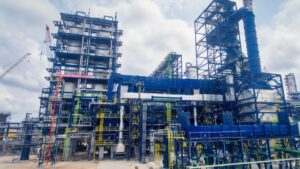


Synergy, commitment crucial to clean energy transition, sustainability in Africa — CEO, Egbin Power
As carbon emissions reduction and energy security remain a crucial focus in the global sustainability agenda, shared commitment, synergy and decisive actions are the cornerstone of accelerating the transition to cleaner energy and achieving a sustainable environment.
Having analysed the percentage of global greenhouse emissions attributed to sectors including electricity/heat production, agriculture/forestry and land use, transportation, industry and others, the Chief Executive Officer, Egbin Power, Mokhtar Bounour, charged for synergy and renewed commitment among stakeholders.
He made this known at the maiden edition of Asharami Square, a Sahara Group initiative aimed at amplifying the discourse on sustainability through impactful media advocacy.
While highlighting Egbin Power’s unwavering commitment to reducing carbon emissions and promoting sustainable energy sources, Bounour further stressed the need for deepened engagement and advocacy to further prioritise sustainability.
Bounour outlined Egbin Power’s comprehensive approach to sustainability, which includes an array of pragmatic initiatives such as obsolescence management, asset upgrades, energy efficiency improvement, sustainability and environmental impact management, and fugitive emissions minimization.
These programs are strategically designed to effectively address carbon emissions and promote cleaner energy initiatives.
According to him, Egbin Power drives sustainability through afforestation, adoption and enforcement of ANSI Lighting Design Standards for the Egbin built environment, a gradual switch from Internal Combustion Engines (ICEs) to Compressed Natural Gas (CNG) and the integration of Electric Vehicles (EVs) into the company’s operations, among other interventions.
“These actions demonstrate Egbin Power’s commitment to thinking globally and acting locally, ensuring that deliberate and impactful steps are taken to promote sustainability and environmental consciousness actively.
“As a responsible organisation Egbin Power is steadfast in its commitment to promoting sustainability.
“Our roadmap and initiatives are designed to align with global sustainable development goals and to ensure that we contribute to a cleaner and more sustainable energy landscape in Africa.
“Our pragmatic initiatives which include obsolescence management, asset upgrades and overhauls, energy efficiency improvement, sustainability and environmental impact management, and fugitive emissions minimization as part of programs designed to address carbon emissions.
“We are committed to treating the environment with the utmost care, knowing well that every activity we engage in – either as an individual or collectively as an organisation has an impact on the ecosystem,” Bounour explained.



